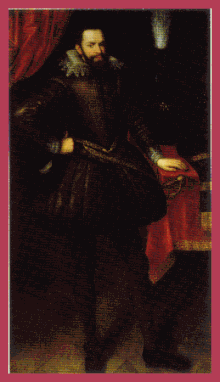Thomas Dale
| Thomas Dale | |
|---|---|
 |
|
| Died | 19 August 1619 Machilipatnam, India |
| Nationality | English |
| Occupation | Naval commander, deputy-governor of the Virginia Colony |
Sir Thomas Dale (died 19 August 1619) was an English naval commander and deputy-governor of the Virginia Colony in 1611 and from 1614 to 1616. Governor Dale is best remembered for the energy and the extreme rigour of his administration in Virginia, which established order and in various ways seems to have benefited the colony, although he was criticised for high-handedness. He is also credited with the establishment of Bermuda Hundred, Bermuda Cittie (sic), and the ill-fated development at Henricus.
Little is concretely known about Dale's early life and there are no remaining records of his birth date, birth location, or his parents' names, although it is likely that he was a member of the Dale family of Surrey, England or was part of an Anglo-Dutch family. He married Elizabeth Throckmorton prior to his departure for Virginia in 1611. It is unknown if the pair had any children together.
From about 1588 to 1609, Thomas Dale was in the service of the Low Countries (the Netherlands and parts of modern Belgium) with the English army originally under Robert Dudley, Earl of Leicester. Because of his ability and ambition, he became friends with many people in positions of authority. In 1599 Thomas Dale was recruited by the Earl of Essex for England's army. After many years of training he was knighted by King James to become "Sir Thomas Dale of Surry" on 16 June 1606. He has a high school in Chester,Va named after him.
While Dale was still serving in the Low Countries, on the recommendation of the eldest son of King James, Henry Frederick, Prince of Wales, the States-General of the United Netherlands consented "that Captain Thomas Dale (destined by the King of Great Britain to be employed in Virginia in his Majesty's service) may absent himself from his company for the space of three years, and that his said company shall remain meanwhile vacant, to be resumed by him if he think proper."
...
Wikipedia
